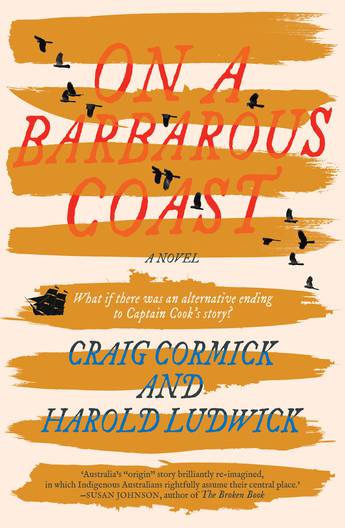wrul@bookwyrm.social reviewed On a Barbarous Coast by Craig Cormick
matters of fluency
2 stars
Narrative, themes, and mood flow exceedingly well across the scale of the entire novel, while very frequently individual sentences disintegrate. Some short paragraphs are riddled with ridiculous quantities of parenthetical translations that could have been skimmed out, by way of ever so slightly more evocative wording around those terms written in‐Language. Instead, the Guugu Yimidhirr boy’s chapters sputter along, tiresome despite their brevity. Comic timing, for instance, pulls through the prose more intact within the chapters from the perspective of the co‐narrating white man.
And through that boy and that man storms the worst problem: not only does talk of people always wind up actually being of men and boys, but the authors’ extensive and careful planning is built on the same mistake. Women (let alone anyone else) scarcely exist in the worlds of this book, and primarily as leverage for expressions of machismo (or in sometimes backhanded authors’ acknowledgements …
Narrative, themes, and mood flow exceedingly well across the scale of the entire novel, while very frequently individual sentences disintegrate. Some short paragraphs are riddled with ridiculous quantities of parenthetical translations that could have been skimmed out, by way of ever so slightly more evocative wording around those terms written in‐Language. Instead, the Guugu Yimidhirr boy’s chapters sputter along, tiresome despite their brevity. Comic timing, for instance, pulls through the prose more intact within the chapters from the perspective of the co‐narrating white man.
And through that boy and that man storms the worst problem: not only does talk of people always wind up actually being of men and boys, but the authors’ extensive and careful planning is built on the same mistake. Women (let alone anyone else) scarcely exist in the worlds of this book, and primarily as leverage for expressions of machismo (or in sometimes backhanded authors’ acknowledgements at the close, where worth is granted to one research contributor only as a proxy of esteemed men???). This monogender may be plausible in the case of a shipwrecked crew of the Endeavour, but reads grossly conspicuous in the lives of the local clans. Even elders always always always denotes only men — what have they been doing to all the aunties?! It would not even take a particularly close reading to see that the excuse of a boy’s‐eye view cannot account for this exclusion. In general, depictions of sexuality and gender fail to come across as convincing, considered, or — frankly — researched. Maybe they were grounded in all that historical scouring the authors’ notes speak of, but there seems to have been no thought to checking for bias.

